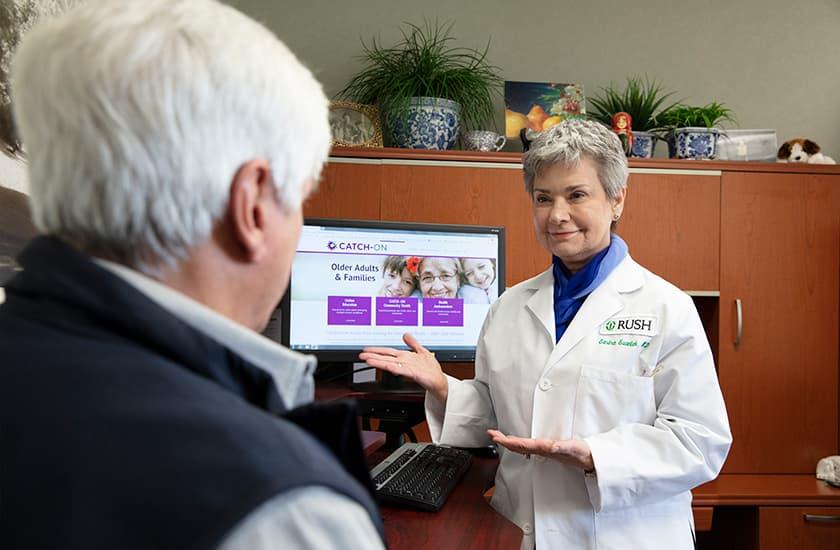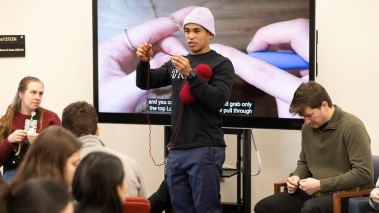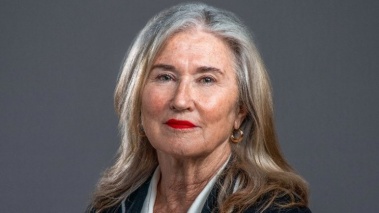According to the U.S. Census Bureau, the nation’s population aged 65 and older is expected to reach 83.7 million in 2050. That’s nearly double the 43.1 million Americans in that age range in 2012.
Education efforts are needed to ensure that caregivers, health care workers and older adult patients themselves are tuned in to the unique needs of an aging population. In an effort to meet that need, Rush University Medical Center is leading CATCH-ON, a Geriatric Workforce Enhancement Program, or GWEP.
CATCH-ON, which is an acronym for Collaborative Action Team Training for Community Health — Older Adult Network, is one of the nation’s 44 GWEP initiatives, which are funded by the U.S. Health Resources and Services Administration. CATCH-ON, which started in 2015, provides training and assessments for federally qualified health centers across the country.
Geriatric specialists from Rush’s Department of Psychiatry and Behavioral Sciences, in collaboration with 34 state partners, are helping provide leadership to the CATCH-ON initiative.
“We currently have a tiny fraction of the number of geriatric specialists needed across health care,” says Erin Emery-Tiburcio, PhD, co-director of CATCH-ON and a geropsychologist at Rush. “The need to educate is significant.”
Education and clinical transformation
CATCH-ON has developed 14 online interactive training modules, five of which have been adapted to educate patients and caregivers.
Topics for professionals and students range from how to manage multiple chronic conditions to information on how to work in teams. Modules for patients and caregivers include a look at the effects of normal aging and how working with a team of clinicians can provide better health care.
CATCH-ON also reviews patient cases and provides aging experts who present on various topics at health care centers. At Cherokee Health Systems, staff have been able to decrease high-risk medication use among its older adult patients by 17 percent within a year of starting its affiliation with CATCH-ON.
In addition, CATCH-ON conducted readiness assessments at five Illinois clinics to measure how equipped they are to optimize workflow for older adult care. Assessments are followed by recommendations and assistance with implementing best practices. For example, CATCH-ON helped Lawndale Christian Health Center create a health risk assessment tool to screen its older adult patients.
Interprofessional education
CATCH-ON’s education efforts include every member of the health care team, from physicians, nurses and patients to residents, fellows, medical assistants, caregivers and workers at the front desk.
“We need to reach as many people as possible,” says Laurin Mack, PhD, a psychologist at Rush who has led many of CATCH-ON’s community education initiatives.
Each member of the team who interacts with a patient has an opportunity to observe and help the team build a more complete understanding of the patient’s concerns and needs.
“We don’t necessarily have the whole story about a patient until we put all of our little bits and pieces of experience together,” says Sandra Swantek, MD, chief, Section of Geriatric Psychiatry at Rush and a member of the CATCH-ON team.
New learning modules
CATCH-ON is working on new learning modules to help health system professionals recognize and manage older adult concerns. New modules include the following: recognizing the role caregivers play in the care of older adults, fall prevention, the risks of polypharmacy, and recognizing and treating depression. Another module will address delirium and dementia, which are often underrecognized problems in older adults.
Delirium is a dangerous condition that can have devastating consequences for the patient if untreated. Older patients with delirium take a longer time to recover than younger patients. That may result in a misdiagnosis of dementia, which increases the recovery time of an older adult with delirium.
“A clinician’s approach to a person who has a dementia-related memory problem such as Alzheimer’s disease is very different than the approach for a person who has disturbance associated with delirium,” says Suzanne Musil, PhD, a neuropsychologist at Rush who is leading the effort to create the new learning module. “So it’s very important for caregivers to understand what it is that they’re seeing in a patient so they can best manage their care.”






